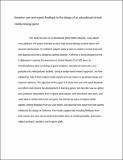| dc.contributor.author | Wang, Annie | |
| dc.contributor.author | Thompson, Meredith | |
| dc.contributor.author | Roy, Dan | |
| dc.contributor.author | Pan, Katharine | |
| dc.contributor.author | Perry, Judy | |
| dc.contributor.author | Tan, Philip | |
| dc.contributor.author | Eberhart, Rik | |
| dc.contributor.author | Klopfer, Eric | |
| dc.date.accessioned | 2021-10-27T20:35:39Z | |
| dc.date.available | 2021-10-27T20:35:39Z | |
| dc.date.issued | 2019 | |
| dc.identifier.uri | https://hdl.handle.net/1721.1/136492 | |
| dc.description.abstract | © 2019, © 2019 Informa UK Limited, trading as Taylor & Francis Group. This study focuses on an educational game titled Cellverse, a two-player cross-platform VR project intended to teach high school biology students about cell structure and function. In Cellverse, players work in pairs to explore a human lung cell and diagnose and treat a dangerous genetic disorder. Cellverse is being designed by the Collaborative Learning Environments in Virtual Reality (CLEVR) team, an interdisciplinary team consisting of game designers, educational researchers, and graduate and undergraduate students. Using a design-based research approach, we have enlisted the help of both subject matter experts and user testers to iteratively design and improve Cellverse. The objective of this paper is to share how user and expert feedback can inform and enhance the development of learning games. We describe how we gather and synthesize information to review and revise our game from in-game observations, semi-structured interviews, and video data. We discuss the input of subject matter experts, present feedback from our user testers, and describe how input from both parties influenced the design of Cellverse. Our results suggest that including feedback from both experts and users has provided information that can clarify gameplay, instruction, subject portrayal, narrative, and in-game goals. | |
| dc.language.iso | en | |
| dc.publisher | Informa UK Limited | |
| dc.relation.isversionof | 10.1080/10494820.2019.1678489 | |
| dc.rights | Creative Commons Attribution-Noncommercial-Share Alike | |
| dc.rights.uri | http://creativecommons.org/licenses/by-nc-sa/4.0/ | |
| dc.source | Other repository | |
| dc.title | Iterative user and expert feedback in the design of an educational virtual reality biology game | |
| dc.type | Article | |
| dc.contributor.department | Massachusetts Institute of Technology. Program in Comparative Media Studies/Writing | |
| dc.relation.journal | Interactive Learning Environments | |
| dc.eprint.version | Author's final manuscript | |
| dc.type.uri | http://purl.org/eprint/type/JournalArticle | |
| eprint.status | http://purl.org/eprint/status/PeerReviewed | |
| dc.date.updated | 2021-04-15T17:04:23Z | |
| dspace.orderedauthors | Wang, A; Thompson, M; Roy, D; Pan, K; Perry, J; Tan, P; Eberhart, R; Klopfer, E | |
| dspace.date.submission | 2021-04-15T17:04:24Z | |
| mit.license | OPEN_ACCESS_POLICY | |
| mit.metadata.status | Authority Work and Publication Information Needed | |
